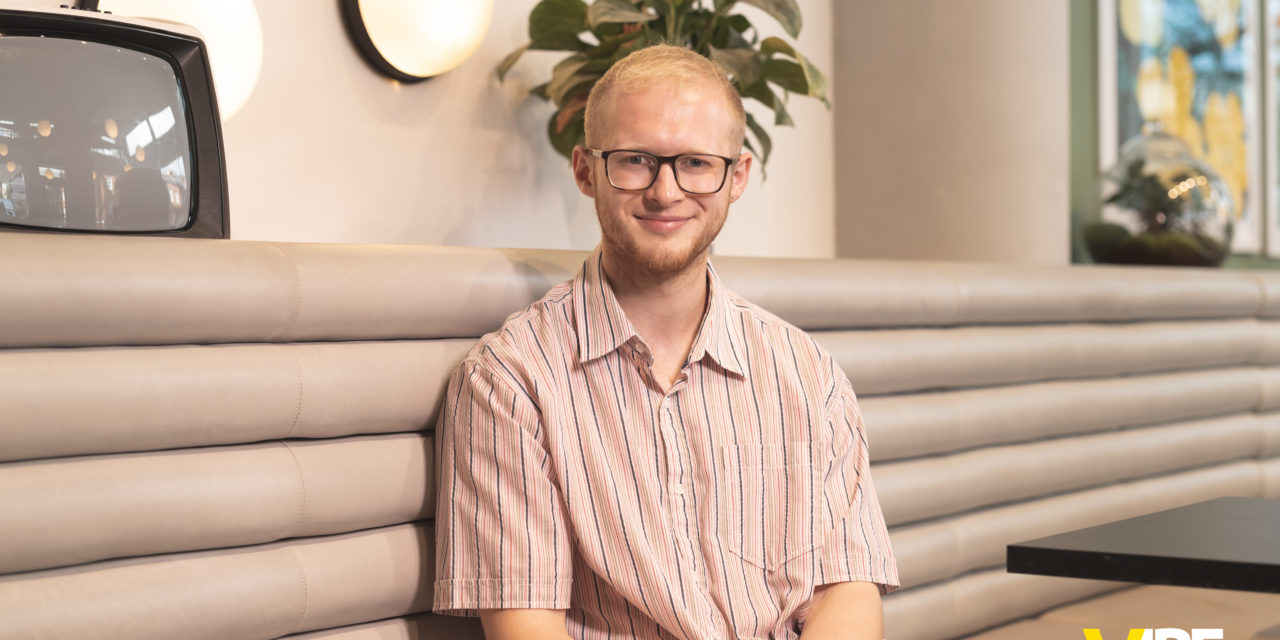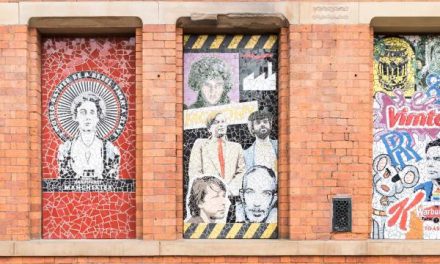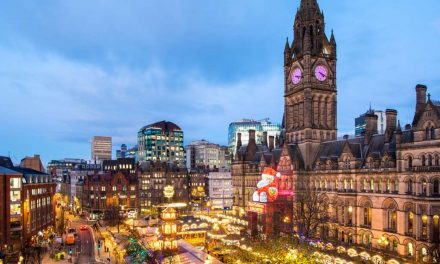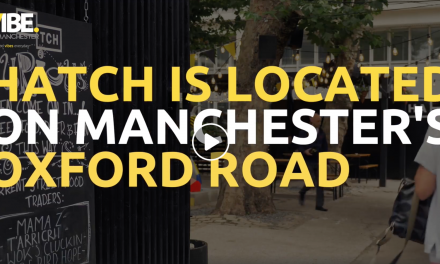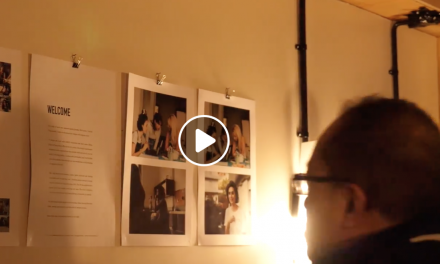Name: Stewart Knights
Age: 22
From: Walkden, Salford
Lives: Manchester
How did you first get into art? How long have you been doing it?
I did, when I was younger, prefer the creative subjects, or subjects that had the flexibility to be creative. So I didn’t like maths at the time, because it was a bit too structured for me, chemistry, biology, all that kind of stuff, learning stuff by rote didn’t interest me. Whereas subjects like English, even history, to a certain extent, all those kinds of things, that was where I was like, wow, that is just me, you know, especially art as well. So I did that, I did a liberal arts as well, but I was much more of a digital artist and I did installations and stuff. But then I guess, as far as painting is concerned, I’ve never been a painter or anything like that. I’ve never even considered it to be my remit of skills, I was a terrible drawer, I’ve only just started getting passable by this point, I was really bad at drawing for ages. As far as digital work, videography, photography, I’ve been doing that for years and written pieces as well, like fiction writing. So I’ve always been creatively stimulated, I was a restless child, you know, I was always doing something, it’s still the same now.
But honestly, I’ve had the most villainesque type journey, I did business at Uni and then went into finance. I’m embarrassed to say that I did business, it certainly wasn’t the right degree for me, I did it off a whim and I think the syllabus of business and the whole sort of institutional context, it’s a bit outdated, you realise that you trust a lot of those people in positions of power and seniority, you think they’ve got your best intentions at heart, and that’s rarely true.
As far as painting goes, it was only after I went to the first Art For Our Sakes exhibition, saw a piece by an artist I admired, that I thought, you know, God the joy that this artist must have got, and that actually lead me to try it myself. Basically, I used to be a skateboarder, still am, and I was doing a documentary on skateboarding, on what it means to skateboarders, what it means for the city etc and I was going through people doing some individual interviews. I came across Jasper and he was posting on his Instagram that he was going to be exhibiting his artwork at AFOS and I went to it and the rest was history. It was this orangey piece and I actually bought it because I was like, I just have to have it. I was looking at it and I must have stared at it for hours and hours and then I was like, you know what, I just need to pick up a paintbrush and just give it a go myself. The first ones I painted were tiny little things and it’s now evolved to like, these bigger pieces. I’m just enjoying messing around with them rarely and it’s just amazing exploring.
I think it’s such a testament to the power of access, really, creating something like that. Whether it’s an exhibition for someone to come and enjoy, or whether it’s a workshop where you can facilitate some kind of creative output for someone who may never have tried painting before or someone who just doesn’t have the access to materials normally, it’s great. It got me hooked, and I’m very privileged that I can afford the materials after quitting my job and putting the money to good use. Just being there and being amongst other artists, and then, in workshop contexts actually having the materials provided for you, it can change the trajectory of someone’s life.
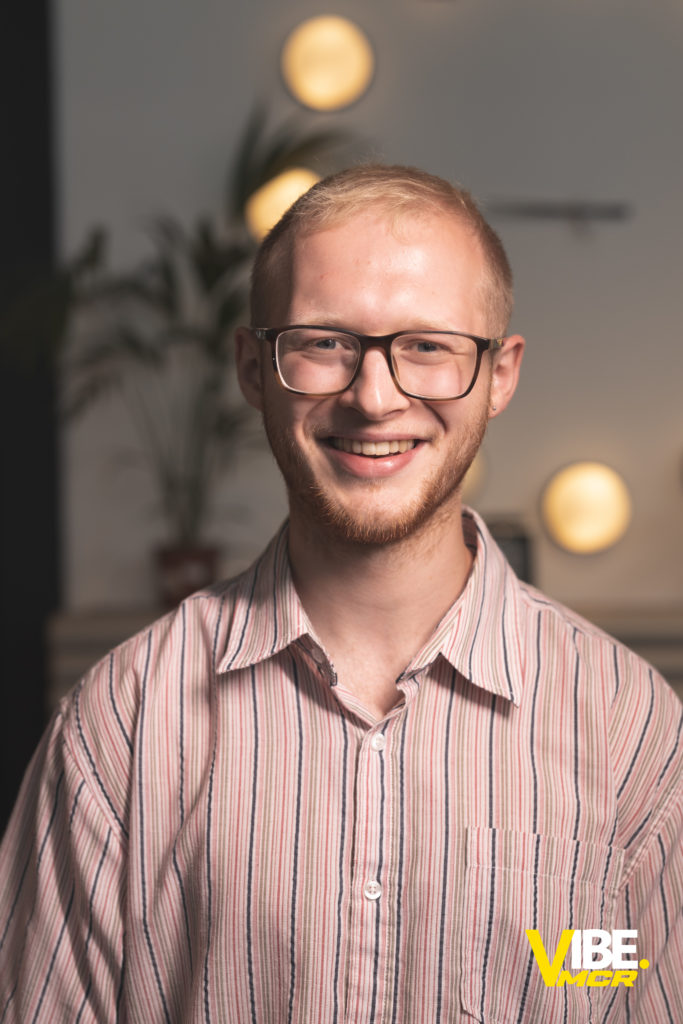
Who is your favourite artist and what is kind of like your favourite genre of art? What have your inspirations been?
It’s so difficult but I’d say my favourite artist at the moment is Lubaina Himid, she’s actually a lecturer at the University of Central Lancashire. But she recently had a solo exhibition at the Tate that I went to see. I hadn’t heard of it before, I’m ashamed to say but I went. And her work is just incredible. The colours that she uses are the first thing that draw you in, they’re so well balanced. Then as far as the actual dialogue that she’s trying to pursue, successfully pursuing in fact and getting you to think about throughout the pieces, it’s absolutely incredible. There’s these concepts by this author called Paul Gilroy called the Black Atlantic that I’m exploring at the moment, he talks about how you know, it’s trying to critically unpack the impact of the transatlantic slave trade, and Lubaina for me, she infuses a lot of this black Atlantic into her work and in such an elegant way. I had to buy the book on it. There’s some incredible interviews in this book as well.
So that’s what I’m inspired by at the moment and that’s led me down a whole rabbit hole of Paul Gilroy, Chris Ofili. Christopher did a great piece called union black. Then of course all the greats as well like Monet, I think they’ve always got something to say for themselves.
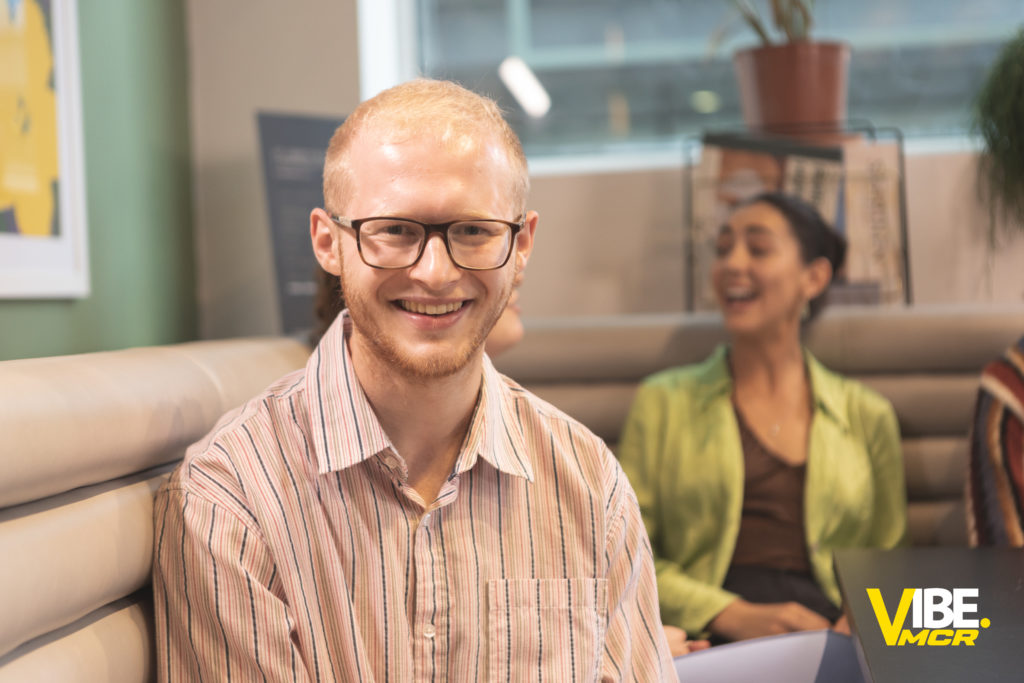
how would you describe yourself as a person and as an artist? How would you describe your artistic style?
I think as a person, I’m quite naive. And I think my style of artwork reflects that in a way. The way that I paint, I come up with an idea- this is just my process at the moment, I’m sure it’ll change at some point- but I get caught up with an idea and it’s usually split into three sections. So one piece, for example, you’ve got a graveyard, a sunset, and then a house and that piece is actually linked with another piece of, two girls by a tree and the two pieces become a whole. I usually split ideas off in to three pieces and usually it’s just things that strike me as interesting, but I don’t necessarily know why. So for example that series was actually, produced when a few friends and I went to Morcombe. It’s hard to describe the style of the work, for me it’s all just questions. I’d love to go into creating a piece and be like, I want it to say this exactly but it never happens like that unfortunately, there’ll be some things that guide the piece along and connects it but I spend quite a lot of time looking at them going, this is so frustrating, because I can’t see what links them all. It’s actually quite nice though because despite the frustration I just started going off on tangents and looking at other stuff.
I say it’s naive, because, you know, it often has quite naive assertions, for example one of them, I wanted to explore the women’s social and political union because of the suffragettes in Manchester and the work that they did, and I’ve now gone down this entire rabbit hole of, you know, Christabel and Emmeline Pankhurst, maybe weren’t all they were cracked up to be in as far as, they weren’t actually the sole originators and the movement was much more complicated than how it’s presented. So, I come in with this assertion, I come in with an idea for the piece, I split them up into different sections and I try to explore certain ideas as I’m going through it, make all the pieces I create link, explore parts of Manchester’s history- but then I realise it all actually comes from the fact that I don’t know enough about Manchester’s history to do that.
I think that the things that we focus on to do with Manchester, you know, the Manchester Bee and industrialization, it’s so narrow, you know, Manchester’s such a complicated city. That’s what I wanted to explore, the Suffragettes is a good example, that should get way more attention. So I go in with this kind of stuff, do my own research thinking, okay, you know, what was the suffragette movement like in its entirety? And then I put the pieces together you know, Elizabeth and Christabel in one painting and then this other thing that started around that time in another. They then sit there as like, assertions that I make of, here’s my exploration of that era, but then when I look at the paintings again, they’re more like questions, because I don’t know enough about the topic area!
But I think that’s what I like about art really, it’s got to be inquisitive. I don’t know enough about enough things to give you any kind of objective truth within the pieces, there’s nothing true about it but it’s quite nice to just leave it as an open-ended question and then you can make of it what you will, so that’s quite fun. It’s an opportunity for dialogue.
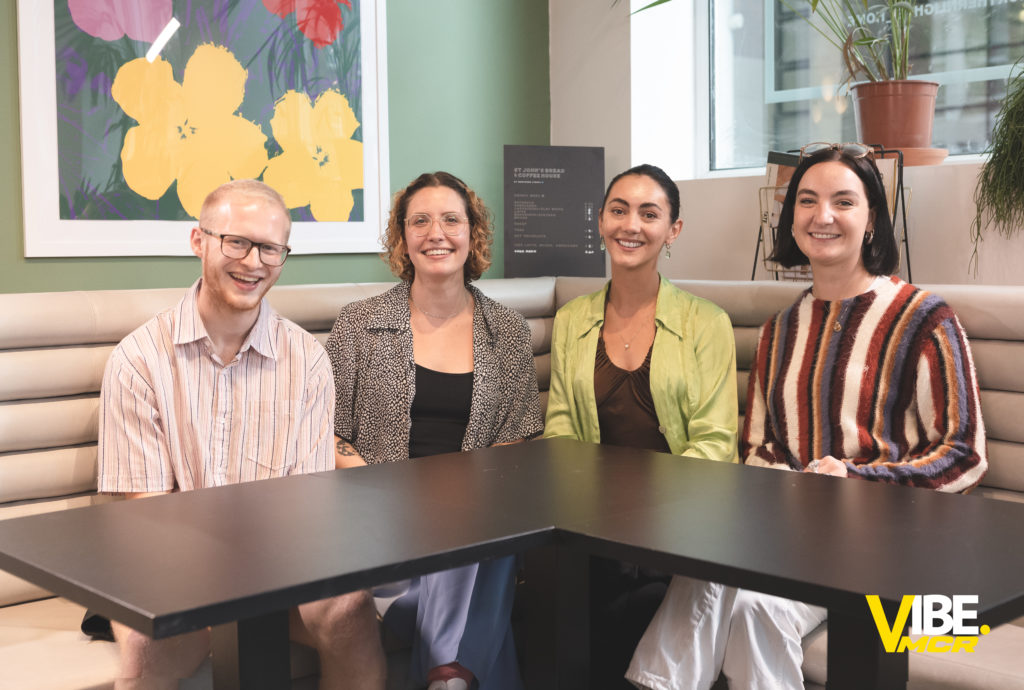
What are your thoughts about the art scene in Manchester? Do you feel it’s helped you?
Definitely. First off, Manchester is such a creative hub. I think what’s so beautiful about it in comparison to London, is that it’s so intimate, it’s just like one boroughs of London, so if London was just Camden or something, that’d be Manchester. Just because creatively, it’s quite intimate, in that you’re brushing shoulders with people quite a lot, you brush shoulders with all kinds of people from all different professions and specializations, like going over to Salford you start getting some more of the music side of things. Overall, Greater Manchester is very creative. The scene is serving me well, but I don’t know whether that means it’s serving everybody well. I think that that’s an important distinction to make. Personally, I don’t know enough about the scene just yet to say whether it’s headed in the right direction or the wrong direction. I think the likes of Art For Our Sakes, they’re putting on some pretty cool events so you know, it’s good to see them about, you know, you’ve got places like Northern Lights and stuff like that. I think there are some very positive developments within the Manchester creative scene. As far as serving everyone is concerned, that’s a different question, one that I can’t answer, because I don’t have enough experience yet but I think would be interesting to pursue, but from what I’ve seen, the access is getting better. I’ll be interested to see how it maintains that momentum and continues to create an environment that serves everybody.
What would you say is the best thing about being an artist?
So I think the best thing about being an artist at the moment, for me, is just the complete freedom to pursue whatever kind of intellectual or creative itch comes up. I did not expect that I’d have bought half the art books that I’ve bought over the past few months. I think what I’ve found from Art, I’m just asking questions constantly, sometimes it’s introspective, sometimes I’m trying to understand something very specific, I just don’t have enough knowledge about it yet. So it’s quite fun to pursue those kinds of resources. You know, I used to be terrible at remembering people’s names, absolutely terrible, especially celebrities and stuff like that, but as far as those people that have had an influence on me who are artists, I do not struggle whatsoever. So I think that says something. I really enjoy the fact that, you know, it’s pure curiosity it is all about asking questions and asking the tough questions I guess, in a way that’s like makes them more digestible.
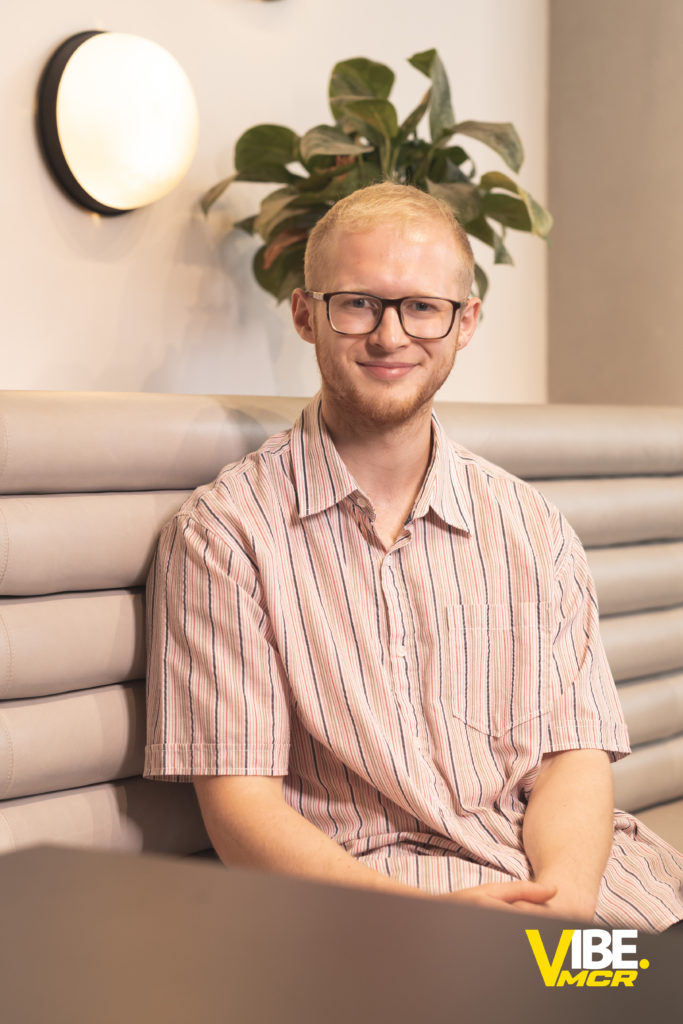
What would your advice be to aspiring artists or anyone thinking about getting into art?
You know I’m still just getting into it, and I think the big thing for me is it’s just all about hearing from different people being very active in hearing what they’ve got say and that’s where you get some quite good advice. It’s also particular to what people want from art what people want from the experience what people want from the environment so I guess that’s the only bit of advice I’d give, be very active in the relationships and conversations you make. I think after being in finance and business I realised the way people treat one another in general is just horrendous, this whole concept of networking in the sense of just having a revolving list of people that you can call on, you know what they’re all good far kind of thing, that’s one thing I’m very happy to step away from and instead cultivate purposeful relationships and then if a bit of luck comes my way then I’m able to help people into that as well who are much more deserving than I am. I think it’s a matter of looking after yourself and looking after the people you care about. That’s my advice, look after yourself and look after the people around you, make sure they’re being served by opportunities in the same way that you are and have a good time as well, that’s the big thing!

